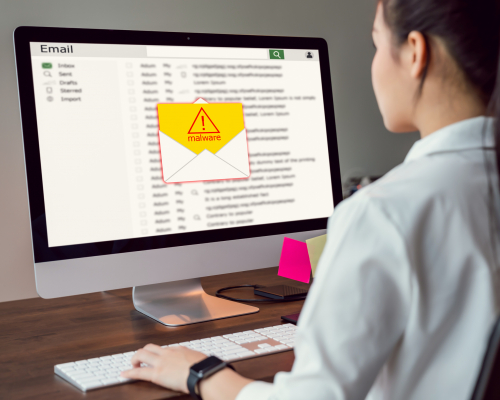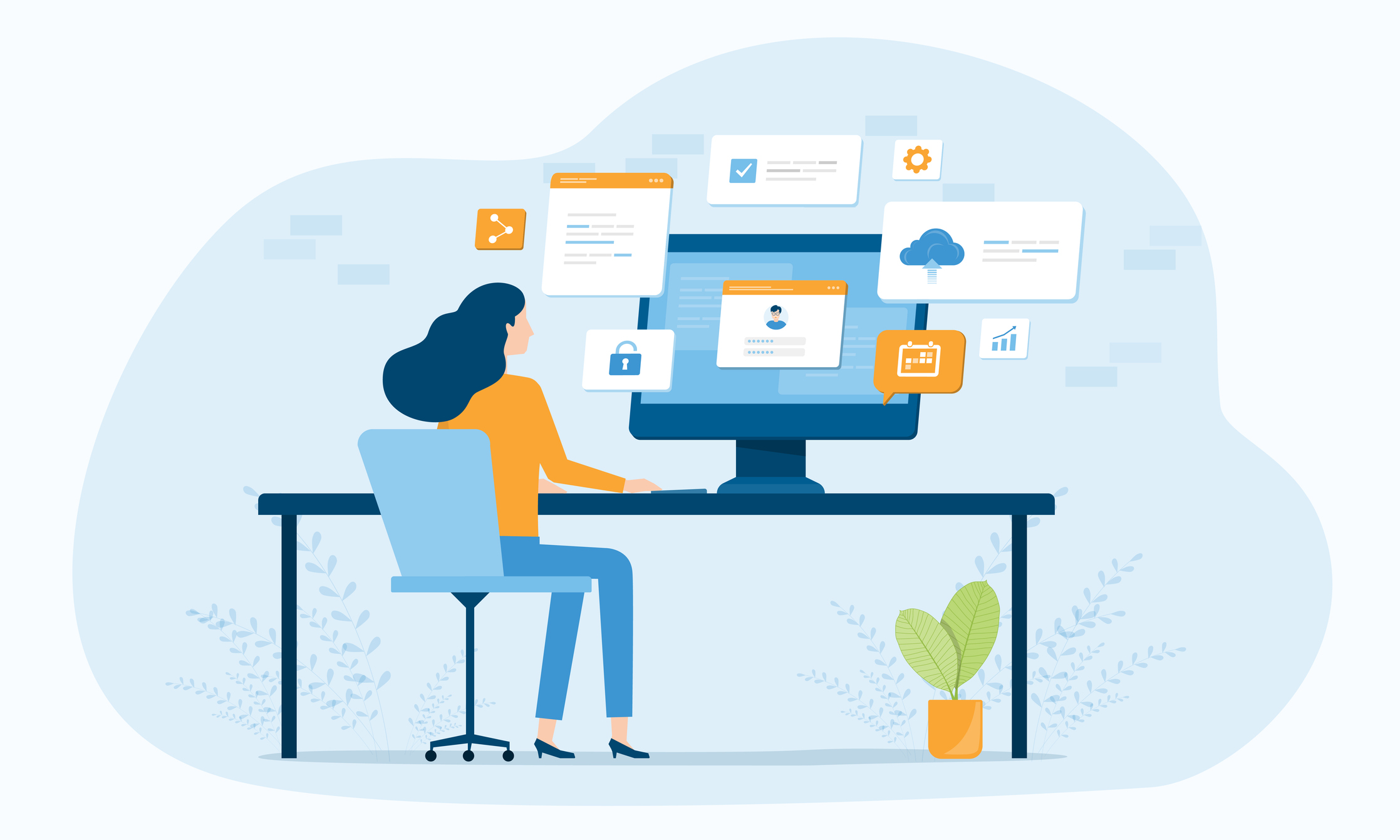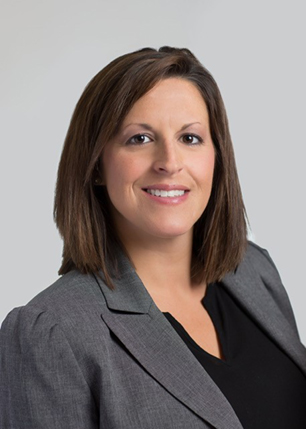
These days, it seems like we use our computers and the internet for everything. Whether it's sending mail, shopping, checking the news, or keeping in touch with friends and family, chances are you're staring at a computer screen when you do it. While there are many benefits for consumers—faster and convenient services, for example—it is important to be aware of the dangers of the internet.
Wherever you find consumers willing to spend money or divulge personal information, you will find criminals seeking to exploit them for personal gain, and the internet is no different. Every year, millions of people fall victim to frauds and scams that begin with an email, text message, or phone call. The cost on consumers is immense, but they suffer more than just the financial losses: fraud can cause damage to their credit history and can lead to a lost sense of security.
This is why New Tripoli Bank is dedicated to promoting cybersecurity. Strong cybersecurity requires smart internet use—you may have the best security systems installed on your computer, but one wrong link click can lead to you becoming the target of identity thieves!
Here are some tips to stay safe while surfing the web:
Be suspicious of unexpected requests for personal information. It doesn't matter how legitimate the email or website looks—only open emails from people or organizations you trust and, even then, be cautious if anything looks questionable. Keep an eye out for typos or other obvious mistakes—scammers send purposefully sloppy emails to isolate the most gullible targets.
Don't share personal information unless you initiated contact. Do not share info over the phone, through the mail, or via the internet in response to an unsolicited request. If you receive a message that appears to be from an organization you recognize instructing to you call a phone number or click a link, ignore the message, and instead visit that organization's website to use their verified contact information.

Thoroughly review your account statements. Make sure you recognize and can account for every transaction that appears on your end-of-month statements and make sure to contact your bank or credit card servicer if you notice any irregularities or unexpected charges.
Use strong passwords. Avoid using birth dates, phone, numbers of Social Security numbers for PIN codes. Don't create a password based on information that can be found on your social media profile or easily guessed.
Be careful what information you share publicly. It's best to show discretion when using social media; any information you share can be exploited by scammers to make them appear as if they are someone who knows you.
Keep your computer updated. All consumer PCs come installed with security software that you should update regularly to guard from the latest malware and viruses.
Avoid unsecured networks. Be careful about where and how you conduct your financial transactions. Unsecured public wi-fi networks can be intercepted by malicious hackers, and you never know who could be watching you enter personal information while you're out in public.

Stephanie Barton is a Senior Vice President and New Tripoli Bank's Chief Information Officer. She has been working for New Tripoli Bank for over thirty years and has overseen the maintenance and upgrading of the bank's digital infrastructure and security.
A smart consumer is more than someone who can find the best deal. They know their spending limits, understand their rights and responsibilities as a consumer, and do research before making a purchase. Smart consumers aren’t tempted by impulse purchases or eye-catching red tag sales; they’re focused on finding a reasonable deal on a product that will last.
Here are some tips for you to make the best decisions when you’re shopping online or at a retail store.

Before Purchasing
Know what you can afford. Keep track of your monthly finances and determine how much money you can afford to spend after paying for groceries, bills, and other necessities. Once you have a number, stick to a spending plan to make sure you don’t live beyond your means.
Research the product. It may feel like a lot of work for something as simple as making a purchase, but proper research can help you avoid buying a product or service with a history of complaints or missing a lower price for the same product. Check product reviews for common issues people have with the product. Investigate the company selling the product and make sure you are buying from a reputable seller; check the Better Business Bureau to see if complaints have been filed against the company.
Beware social media ads. There are many ads that pop up on Facebook and Instagram with great deals. Be sure to do your research before you buy. Use Google search to verify the product and seller. There may be scammers that use Facebook ads, advertising great deals to trick you into entering your card information.
Read the fine print. Before you sign a contract for a big purchase or hire someone for a service, make sure you read and understand everything you are agreeing to. Don’t be afraid to ask for clarification if you’re unsure about something and never sign until you are 100% comfortable. Make sure you get everything in writing, and never pay in full until the job is done and you are satisfied with the workmanship.

While Shopping
Make sure to compare prices. Being a consumer in the age of smart phones means instant access to information that consumers in previous generations could only dream of. If you see a product that you’d like to purchase at a retail store, take the time to look it up online and see if other stores are selling it at a better price. Some retail stores offer price matching, so you don’t even need to make another trip!
Be careful with financing options. Companies sometimes offer 0% financing options for larger purchases (for example, window installations and furniture), which can be great for staying within your budget. However, make sure you understand the terms of any contracts you sign, as these offers usually come with extremely high interest rates that you will be required to pay if you fail to make your minimum monthly payment.
Though most shopping still happens in retail stores, many people have switched exclusively to shopping online since the pandemic, which can come with a whole host of problems for consumers who aren’t careful! When shopping online:
Stick to secure, reputable sites. Look for URLs that start with https://. These websites use encryption to protect your sensitive data. Keep an eye out for red flags such as spelling mistakes, malfunctioning features, or a lack of contact information. When in doubt, search the site’s name to see if the search results are filled with articles about frauds related to the site.
Avoid shopping on public wi-fi or public computers. Hackers will often target users on public networks with keyloggers or other methods to steal your information. You also never know who is watching you in a public place, so it is best to avoid entering personal information in such situations.
Make sure to read all contracts and agreements. Don’t click the check box without reading the documentation. It is especially important to read a website’s terms of use to understand how the company plans to use your data and if they share it with other companies.
Look for a return policy. Any reputable company will have a link to their return policy somewhere on the front page of their website. It’s important to understand your rights as a consumer before you buy.

After Buying
Keep a copy of any receipts, warranties, or service contracts. Consider creating a binder to hold all this documentation, as you may need it later to make a claim or in the event of a recall. You should make copies of any receipts printed with ink that could fade quickly.
Be a responsible borrower. If you financed a purchase or used your credit card, make sure you have a plan to pay it back quickly! Try to pay down outstanding balances immediately if you can. You can also contact a credit counseling service for additional help managing debt.
Make a complaint. If you’re not happy with your purchase, contact the seller and give them a chance to fix the problem. If the issue cannot be resolved, you may want to consider making a formal complaint to the Better Business Bureau or the Federal Trade Commission.
It’s easy to be a smart consumer if you arm yourself with the proper tools. A New Tripoli Bank checking account gives you access to our mobile banking tools such as email/text alerts that are customizable to you, which makes keeping track of spending and budgeting even easier. You can download the CardValet app to help monitor your accounts for fraud. Just make sure the next time you go shopping to keep these helpful tips in mind!

Jen Moyer is an Assistant Vice President and head of New Tripoli Bank's Deposit Operations. She has been a member of the New Tripoli Bank team for nearly twenty years and has worked in multiple departments within the Bank.

The start of each new year is a time for us to reflect on the past year and plan for the next. 2022 was a challenging year for a lot of reasons, not the least of which was record-high inflation that had plenty of people tightening their budgets. As we head into 2023, I'd like to offer some tips to help you establish and maintain good credit so you can enjoy a brighter financial future.
Open a Checking Account
While a checking account can't help you improve your credit score, it does help you balance your budget while you're establishing a credit history. By making credit card and loan payments with your checking account, you will see all of your monthly transactions on a single bank statement rather than having to compare several different statements in order to get a full view of your financial situation.
Another benefit of checking accounts is that most come with a debit card. Using a debit card along with your credit card is safer than paying with cash, since banks offer fraud protection and card controls to help prevent negative impact to your credit if your card is lost or stolen. Make sure to monitor your credit and bank statements regularly, so you can correct any errors and detect signs of potential identity theft.
Automate Bill Payments
One of the easiest ways to damage your credit is to fall behind on loan or credit card payments. Thankfully, most banks (New Tripoli Bank included) offer automatic bill pay through their online banking platforms to ensure that your monthly bills are paid.
An emergency fund is helpful for staying ahead of your bill payments. A good rule of thumb is to set aside enough money to pay for six months of living expenses so that, in the event of an emergency, you can absorb unexpected expenses and avoid penalties for late payments. Thankfully, most banks' online banking platforms allow you to set up automatic, recurring transfers between accounts, so you can set aside a portion of each paycheck for a rainy day into a dedicated emergency savings account.
Show Stability in Your Credit Use
As you work to maintain your credit, you should seek to develop a good mix of credit—for example, paying down a mortgage loan plus credit card payments—to demonstrate that you can manage different types of credit, which can improve your credit score. It is also better to pay down your credit gradually instead of immediately paying off your debt all at once, as it shows you are capable of making payments on time.
If you are planning to use credit for a large purchase, you should adjust your credit usage leading up to the purchase. For at least three to six months prior to your purchase, you should focus on paying down existing debt and avoid incurring new debt.
By establishing these spending and saving habits early, you'll be able to make your money work for you so you can speed up your recovery from temporary financial roadblocks and remain financially healthy. If you are concerned about your financial wellness, New Tripoli Bank offers checking, savings, and lending options to help you navigate pivotal financial milestones and plan for your financial future. Reach out to one of our friendly community bankers who can help steer you in the right direction for 2023.

Kate Hart-Zayaitz is New Tripoli Bank's Chief Lending Officer and Senior Vice President. Kate has spent many years working for various community banks in our area. She was born and raised in Emmaus and has been involved with multiple banking and economic organizations throughout the Lehigh Valley.

Planning to spread some cheer this holiday season? Extend that cheer to your community during the holidays by purchasing one-of-a-kind creations from local small businesses in the Lehigh Valley. By doing so, you’ll be giving a gift that keeps on giving—local economic prosperity.
Did you know that for every $100 you spend at locally owned businesses, $48 out of every $100 is returned to the local economy, compared to just $14 when you shop at a national chain? Or were you aware of the country’s 32.5 million small businesses that create 62% of net new U.S. jobs annually? By shopping locally, you’re not only putting your hard-earned dollars to work in your community; you’re providing the fuel that powers our national economy.
Independent, community-serving businesses typically consume less land, carry more locally made products, and create less traffic and air pollution, so shopping locally is good for the environment too. Moreover, locally sourced goods and services like those found in Lehigh Valley are often crafted by local artisans and are exclusive to our region, making for memorable gift-giving during the holidays and beyond.
If you prefer your gifts without a shiny bow, gift an “experience” of tickets to an outside concert, picking up a meal from the local family-run restaurant, or hosting an intimate party with a few friends and family. Events like these are a great way to make memories and stay connected with one another, while also providing opportunities to support small businesses and help sustain the local economy.
Better yet, continue the movement beyond the holidays. Show support for entrepreneurs and small businesses throughout the year by shopping locally and encouraging your friends and neighbors to do the same. Post a picture or video of your favorite locally sourced product and share it on social media as inspiration for others.
To learn more about how New Tripoli Bank supports local small businesses and the community, you can listen to testimonials from our business customers and the nonprofits we support.

Kate Hart-Zayaitz is New Tripoli Bank's Chief Lending Officer and Senior Vice President. Kate has spent many years working for various community banks in our area. She was born and raised in Emmaus and has been involved with multiple banking and economic organizations throughout the Lehigh Valley.

Nobody likes tricks when it comes to banking. At New Tripoli Bank, we focus on the “treats” that distinguish us as your trusted bank.
We do business the old-fashioned way – one customer at a time - partnered with today’s conveniences like mobile/online banking. It’s been our philosophy since we opened the doors 112 years ago, and it continues to help us serve the unique needs of our customers today.
Community banks’ relationship focus has made us America’s favorite lenders according to a Federal Reserve small business credit survey, with approval ratings well ahead of those megabanks and online lenders.
It’s not just proximity that wins repeat business. Unlike credit unions and the Farm Credit System, New Tripoli Bank effectively serves both individuals of modest means and agricultural borrowers without taxpayer-funded subsidies.
We put our dollars to work right here in the Lehigh Valley, helping to support local school districts, fire departments, EMS departments, and other municipal services. New Tripoli Bank also helps fortify our community through philanthropic outreach and civic service. In 2021 alone, New Tripoli Bank donated over $200,000 to local aid organizations, fire departments, and historical societies.
Our employees volunteer to help in our community. They sit on the boards of the East Penn, Greater Lehigh Valley, and Western Lehigh Chambers of Commerce. Members of our organization volunteer with food banks, churches, youth sports associations, and emergency services all around the valley. For example, volunteers from the bank helped stock shelves at the Lowhill Food Pantry and others handed out free ice cream to patrons of Pioneer Apple Fest.
The treats don’t end there. Community banks have a strong track record of helping underserved Americans by providing greater flexibility to low-income and minority borrowers. It’s the community banking way. New Tripoli Bank is committed to providing community development loans that provide financing for the construction of affordable housing, non-profit organizations serving low-moderate income markets, local and state community development projects, and community revitalization efforts.
We won’t disguise tricks as treats or leave customers holding the bag during times of need. Our fates are linked, so when good things happen for you, New Tripoli Bank and our community win as well. That’s the community banking difference, and it’s pretty sweet.

Autumn is here and while the leaves and temperatures are falling, it seems like the price of food and gas aren't following suit. On top of that, the changing season means more reasons to spend money including increased utility bills, updating your winter wardrobe, and planning for holiday purchases. Here are some tips to help you rake in some savings this fall season.
Winter-proof your home. Some TLC in the fall goes a long way toward cutting down on winter utility bills. Consider improving your home insulation by caulking or using weather-stripping on windows and doors, and clean out your gutters to help with drainage. Cleaning or changing your furnace filter and checking if your roof is in need of repairs are two economical habits essential to prepare for the winter months. You should also consider switching to energy-efficient lightbulbs; though they cost more upfront, they'll save you money on electric bills in the long run.
Save on Appliances. Keep an eye out for your household appliances that are in need of replacing. Stores will put appliances on sale during the fall season to make room for new inventory and the latest models that come out just in time for holiday shopping. If you're shopping in person, ask sales associates if you can purchase floor models, which often come at a discount.
Clean Out Old Items. Take a long, hard look at your closets and storage spaces: they're probably full of items you haven't used in several years! Fall is a great time to clear out these items and make some additional cash while you're at it. Reach out to your neighbors about hosting a garage sale to sell off old, unwanted items, or post them to online shopping sites like eBay or Facebook marketplace. If you have a lot of old, still wearable apparel, clothing swaps are a great way to change up your wardrobe without spending a dime.
Set a Budget. Did you spend a little too freely over the summer? Fall is the perfect time to get your budget back in line. Go over your expenses and identify areas where you can cut back. With the holidays fast approaching, saving extra cash now means you'll have more in your pocket for holiday purchases. New Tripoli Bank's online banking tool makes it easy to track your spending and allows you to set up automated bill payments to make sticking to your budget simpler.
Embrace DIY. Before you spend money on autumn accessories or Halloween décor, tap into your inner artist! Fall is a great time for DIY projects which can be a fun, cost-effective activity to enjoy with your family.
Finding ways to be frugal this season can help you save money while allowing you to enjoy everything the fall season has to offer. The best way to get started with your savings goals is signing up for Free Checking with New Tripoli Bank, which gives you access to our online banking tools that make it easy to keep to a budget.
With the government unveiling its sweeping new student loan forgiveness plan, millions of Americans are going to be looking for a piece of the debt relief package. This is the ideal setting for scammers to swoop in and take advantage of people's eagerness, tricking them into giving up sensitive personal and financial information.
You may be asking yourself "what do I have to do to claim this student loan relief?" You can read the full statement from the White House about the loan forgiveness program here https://studentaid.gov/debt-relief-announcement/
Before you click any email links or enter personal information into unfamiliar websites claiming to be official government pages, here are some tips to keep yourself ahead of the scammers trying to steal your identity.
Subscribe to official email updates from the Department of Education. As part of their announcement of the debt relief plan, the White House has set up a website where you can register to be notified when the loan forgiveness process officially opens. If you are seeking Public Service Loan Forgiveness, visit PLSF.gov to learn more and apply.
Never click on links from unexpected emails. If you haven't signed up for official updates from the Department of Education and you receive an official-looking email regarding student debt relief, don't reply or open any attachments. Before clicking any links, mouse over the link to see if the address pop-up contains a legitimate .gov URL.
Don't email personal and/or financial information. Email systems are not encrypted; therefore, emails should not contain confidential information. If you are asked to visit a website to provide personal or financial information, you should instead visit https://studentaid.gov/ to confirm the loan forgiveness process is officially open; this is the official website of the debt relief program and any application process will be located here.
Don't be fooled by urgent requests. The government will provide a very clear timeline well in advance of any cutoff date for applications. If you receive an email emphasizing the urgency of filling out an application and/or submitting information, this is most likely a scammer trying to take advantage of you.
Ignore anyone asking for money in exchange for debt relief. The government's debt relief program is entirely funded by taxpayers and will not require you to send money to anyone.
If you think you or someone you know have been the target of a scam, you should contact your financial institution as well as contact the FTC.
Cybersecurity should not be limited to the home, office, or classroom. It is important to practice safe online behavior and secure your Internet-enabled mobile devices whenever you travel. The more you travel and access the Internet on the go, the more cyber risks you will face. No one is exempt from the threat of cybercrime, at home or on the go, but you can follow these simple tips to stay safe online when traveling.
Before You Go
- Update your mobile software. Treat your mobile device like your home or work computer. Keep your operating system software and apps updated, which will improve your device’s ability to defend against malware.
- Back up your information. Back up your contacts, photos, videos and other mobile device data with another device or cloud service.
- Keep it locked. Get into the habit of locking your device when you are not using it. Even if you only step away for a few minutes, that is enough time for someone to steal or destroy your information. Use strong PINs and passwords.
While You Are There
- Stop auto connecting. Disable remote connectivity and Bluetooth. Some devices will automatically seek and connect to available wireless networks, and Bluetooth enables your device to connect wirelessly with other devices, such as headphones or automobile infotainment systems. Disable these features so that you only connect to wireless and Bluetooth networks when you want to.
- Think before you connect. Before you connect to any public wireless hotspot – like on an airplane, in an airport, hotel, train, bus station, or café – be sure to confirm the name of the network and exact login procedures with appropriate staff to ensure that the network is legitimate. Do not conduct sensitive activities, such as online shopping, banking, or sensitive work, using a public wireless network. Only use sites that begin with “https://” when online shopping or banking. Using your mobile network connection is more secure than using a public wireless network.
- Think before you click. Use caution when downloading or clicking on any unknown links. Delete emails that are suspicious or are from unknown sources. Review and understand the details of an application before installing.
- Guard your mobile device. Never leave your mobile devices–including any USB or external storage devices–unattended in a public place. Keep your devices secured in taxis, at airports, on airplanes, and in your hotel room to prevent theft and unauthorized access or loss of sensitive information.
Common Cybersecurity Threats While Traveling
- Unsecured wireless networks. While public wireless networks provide great convenience by allowing people to connect to the Internet from anywhere, they are unsecure and provide cyber criminals with a back door to access to your Internet-enabled devices. Beyond the typical public wireless networks found at airports, restaurants, hotels, and cafés, they are increasingly available in other places, such as on airplanes and in public parks.
- Publicly accessible computers. Hotel business centers, libraries, and cyber cafés provide computers that anyone can use. However, travelers cannot trust that these computers are running the latest operating systems or have updated antivirus software. Cyber criminals may have infected these machines with malicious viruses or installed malicious software. One example is keylogger malware which, when installed, captures the keystrokes of the computer’s users and sends this information to the hacker via email. Through this malware, criminals can receive users’ personal information, such as names, credit card numbers, birthdates, and passwords.
- Physical theft of devices. Thieves often target travelers. Mealtimes are optimum times for thieves to check hotel rooms for unattended laptops. If you are attending a conference or trade show, be especially wary — these venues offer thieves a wider selection of devices that are likely to contain sensitive information, and the conference sessions offer more opportunities for thieves to access guest rooms.
Stop.Think.Connect.™ is a national public awareness campaign aimed at increasing the understanding of cyber threats and empowering the American public to be safer and more secure online. The Campaign’s main objective is to help you become more aware of growing cyber threats and arm you with the tools to protect yourself, your family, and your community. For more information visit www.dhs.gov/stopthinkconnect.
At new Tripoli Bank, we understand the importance of helping our community's youth build a strong financial foundation so that they better understand basic concepts like budgeting, simple interest, and establishing and maintaining good credit. I recently read that currently only 21 states in the U.S. require high school students to take a course in personal finance and found it surprising that such a necessary life skill is not a top priority of our education system.
Financial capability education and financial literacy improves the financial health outlook for our youth, better preparing them to tackle unexpected financial situations or be ready for significant life milestones like paying for college, purchasing a home, opening a business, or building a nest egg.
For Gen Z and their parents looking to shore up money management skills and prepare for life in the real world, I'd like to offer the following tips to start you on your journey to good financial literacy.
Set SMART goals
In this case, SMART stands for Specific, Measurable, Attainable, Realistic, and Trackable goals. Choose selective, realistic priorities—whether it's saving for your first automobile or building an emergency fund—and make sure they are achievable. Create a plan of action and measure your progress over time; being able to visualize your progress can motivate you to continue your saving journey.
Start a Savings Account
Did you know you can now open a savings account at New Tripoli Bank completely online? New Tripoli Bank's online and mobile banking tools offer automated money management services for our customers, so you can set up automatic monthly transfers from your checking account to your savings account. Utilizing automated functionality to handle these transfers makes reaching your savings goal less of a hassle.
Consider Seasonal Employment
If you are a student of working age, you should consider filling your free time between school years with part-time or seasonal employment. A job helps you learn more about personal responsibility and provides an opportunity to manage expenses.
Track Your Spending
Take the time to track your monthly spending, then use that information to create a budget. Make sure to review it periodically and make necessary adjustments. Regularly tracking your spending will help you avoid impulse purchases that act as obstacles on your savings journey. New Tripoli Bank's online banking tool has money management tools that help you set monthly budgets and track your spending compared to your goals, so you can adjust your spending habits effectively.
Understand Risk & Reward
For older students with a comfortable financial situation, consider dipping your toe in the wide world of investment. Knowing how stocks, bonds and mutual funds can affect a portfolio shows you how financial decisions can grow—or shrink—your savings. Some high school classes and financial literacy-based websites provide simulations of how investments work in the real world.
Build Your Credit Score
Your credit score is a representation of your financial past, present, and future. A good credit score makes it easier for you to finance the purchase automobiles or homes, rent an apartment, and get a credit card with a good rate. Parents should consider adding their children to their credit cards to help them build credit while being able to monitor their spending.
Gaining knowledge about how to best manage your money is just the start. When young adults practice proper money management techniques early, they're more inclined to make effective financial decisions throughout life. The sooner your children start to grasp these concepts, the more apt they'll be for a better financial future.

The idea of “sustainability” is linked to a lot of local activities these days—whether it’s reusing or recycling products, sampling culinary delights from a local bakery, or choosing to buy American-made products to support our national economy. There are plenty of reasons why eating, dining, and banking locally makes good economic sense.
If you’ve ever wondered if it matters where you deposit your hard-earned money, let me assure you it does. Not only does banking locally support small businesses (community banks fund more than 60% of small business loans and more than 80% of ag loans), but as locally owned and operated businesses themselves, they are part of the economic engines that create 62 percent of new jobs annually.
Community banks like New Tripoli Bank take in deposits and make loans that keep funds right here in the Lehigh Valley and feed our local economy. It is all part of the strong relationship that community banks have with the communities they serve, and the proceeds from those businesses employ residents, fund municipalities, and continue the cycle of local economic growth.
And if you need more proof, consider the community bank response to the coronavirus pandemic.
- Community banks, as economic first responders, made 60 percent of total Paycheck Protection Program loans to small businesses, including 72 percent of PPP loans to minority business owners.
- Community banks outpace large banks in their average number of banks operating in both rural and urban markets by a 3:1 ratio.
- Community banks are the preferred small business lenders, with an 81 percent net satisfaction score compared to 68 percent for large banks and just 43 percent for online lenders.
- Community banks have consistently demonstrated their safety and soundness with higher capital ratios and better loan quality than larger institutions.
- Community banks operate in areas abandoned by others—serving as the only physical banking presence in nearly one in three counties.
But it is not just about stats. When customers contact New Tripoli Bank, they are greeted by a talented team member who is attuned to their needs and empowered to act on their behalf.
And when our employees log volunteer hours in support of the Lowhill Food Pantry or Miracle League of the Lehigh Valley or when New Tripoli Bank contributes to East Penn Restaurant Week or the Allentown Symphony Orchestra, we are working toward our goal to ensure economic prosperity for the community we call home.
April is Community Banking Month, and I want to thank our customers for putting their trust in us for their banking needs. For our neighbors who may be considering a switch, I implore you to take a closer look at New Tripoli Bank to discover how we can help you realize your financial dreams.
At New Tripoli Bank, we pledge to never lose sight of the all-important relationship and the personalized service our customers expect. After all, at New Tripoli Bank, people are more valuable than money.
Remember, we are all in this together. Community banks like ours are only successful if our customers and communities are, too. That is why community banks and our relationship business model have thrived for more than 110 years. We know what it takes to create successful local economies. Join us in helping to build a more sustainable, vibrant economy here at home!
Next Page »« Previous Page
 Log In
Log In

 Log into Online Banking
Log into Online Banking